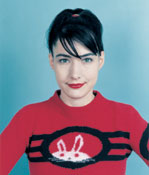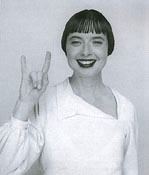 |
  |
 |
  |
 |
 |
| |

Read Bjork's2001 interview with Juergen Teller from the index archives. |

|
 |

Kathleen Hanna discusses writing and making music in this interview from 2000 with Laurie Weeks. |
|
 |
|
 |
|
|
 |

Isabella Rossellini spoke with Peter Halley in this 1999 interview. |
|
 |
|
|
 |
 |
|
Alexander McQueen's 2003 interview with Bjork. |
|
 |
|
|
 |
|

|
Mark Firth and Andrew Tarlow, 2004
WITH ELLA CHRISTOPHERSON
PHOTOGRAPHED BY NINA ANDERSSON |

Amid the bustle of their new place, Marlow & Sons, a grocery store and oyster bar, Ella talked to Mark and Andrew. Chef Caroline Fidanza popped in to check on the details of the evening's menu, while Mark's nine-month-old, Lucien, sat on his lap.
ELLA: You guys always seem to have new ventures in the works.
MARK: Often it just happens naturally. We weren't even looking to open a new restaurant when Bonita fell into our laps. The woman who owned the restaurant had died, and her son approached us.
ELLA: You've kept the "cantina" sign in front of the restaurant.
ANDREW: We have a passion for Mexican food. The fajitas stuffed with salt cod, which we were serving over Easter, were really good. And the chiles rellenos are great.
MARK: The food is totally authentic. It's hard for people to believe it because two non-Mexican guys own the restaurant.
ELLA: Then how do you do it?
ANDREW: Initially we intended to hire Mexican guys who had experience in American kitchens. We put up ads all over a predominantly Mexican neighborhood in East Williamsburg. But instead we found a lot of Mexican women with no restaurant experience, who were just cooking at home for their families. They've worked with us as consultants. We figured out how to turn their ideas and recipes into workable dishes for a restaurant kitchen. They've been an inspiration.
ELLA: Are you still working with these same women?
ANDREW: Oh yeah. We're always picking their brains, doing trial runs of dishes. Along with our regular menu we run six specials for two weeks at a time. And every week we try out a new dish.
ELLA: Did you work in restaurants before you opened Diner in 1998?
MARK: We met waiting tables at Odeon in 1994. I grew up in Zambia, and Andrew had just come back from a year in Africa. So we started talking. Then Andrew moved on to Balthazar. We were both restless — we were making good money, but we felt underappreciated.
ANDREW: I think at a certain point in your life, you decide you have to start thinking about yourself and can't work for someone else.
ELLA: Your newest venture, Marlow & Sons, is a small grocery store attached to an oyster bar. How did that come about?
MARK: In Europe, when you go home after a day's work, you stop in to the local grocery store where Bruno, or whatever his name is, works behind the counter. There's always a tiny little bar. You have a hard-boiled egg and a glass of wine, and you can buy pasta for your dinner. It's your local everything. We loved that idea. We wanted to open a place where you could pop in on your way home, have a bite to eat or a drink, and then buy groceries for your dinner and a bottle of wine.
ANDREW: It's so civilized. And we love
oysters.
ELLA: Where do your oysters come from?
ANDREW: Right now, we have Buzzard Bay
oysters from Maine.
MARK: They were out of the Spinney Creeks. When we told our fish purveyor, Chris, about our plans for Marlow, he said, "I'll get you the best oysters available at each time of year. Even if you offer only one East Coast variety and one from the West Coast, they'll be the best around." So far, he's been spot-on.
ELLA: When you opened Diner in 1998, this area of Williamsburg was pretty desolate. How did you attract an audience?
ANDREW: It was totally word of mouth. We built up our clientele person-by-person, meal-by-meal. Thanks to our chef, Caroline Fidanza, our reputation is based on good food.
MARK: People won't go to a restaurant more than once or twice for atmosphere alone.
ANDREW: When Mark and I started talking about opening a restaurant, people thought we were heading for disaster. We probably would have been if we hadn't found Caroline.
ELLA: How did you meet her?
ANDREW: Through a friend. She was working at Savoy in Soho and was ready to move on. Caroline's been a major force for us. She put us on the map.
MARK: The big joke is that she studied
vegetarian cooking and now just adds pork
to every recipe she learned.
ANDREW: On New Year's Eve 1998, just after
we finished renovating, we had a sit-down dinner at Diner for about twenty-five people. Everybody who helped on the construction was invited. We had no gas — and no heat.
MARK: Caroline cooked a pork cassoulet at our apartment down the street, and we carried it up the road in steaming pots. That was the best meal, to this day, that she has ever made.
ELLA: Before you opened Diner, wasn't there a restaurant called Stacey's in the same space for a short time?
ANDREW: I think it was here for a good solid year. Then, after that, it was Sabrina's.
MARK: They used Stacey's for some scenes in the movie Donnie Brasco — the scene where Johnny Depp's feeding burgers to the lion was shot right outside. The owner obviously got some money from the movie and figured he'd close, and then Sabrina's opened. It was Polish-American-Italian-Spanish comfort food. That's what the sign said. It covered the whole outside of the building.
ANDREW: And it was yellow.
MARK: The food was bad, but Sabrina was
a really nice lady. She had all her kids working there as waiters...
ANDREW: ...and they couldn't add up the check.
MARK: You had to add it up yourself. It'd
be maybe six dollars, you'd give the kid a twenty, and the kid would go in the back,
out the side door, and you'd never see your change. [laughs]
ELLA: In your early days, it must have helped that Diner was across the street from the Gretsch Building. It was one of the first loft spaces that artists occupied in this part of Williamsburg.
ANDREW: It was only after we opened that we realized that the Gretsch Building was filled with people who didn't have kitchens. So Diner became their kitchen. We automatically had a customer base coming in every night. At three in the morning, the place would be full of people from across the street.
ELLA: Diner has a surprisingly short regular
menu — moules frites, hanger steak, a house burger — but it's complemented by ten or fifteen daily
specials.
MARK: We don't want to cook with off-season ingredients just to fill up a more extensive menu. Last summer, we even started buying our vegetables directly from an Amish organic farmer in Pennsylvania.
ANDREW: We met Henry through my girlfriend's dad who also has an organic tomato farm in Pennsylvania. Henry's got thirteen kids.
MARK: And dresses impeccably.
ANDREW: As soon as you meet him, you can
just tell he's a farmer. It's in his eyes,
in his hands. You know this guy grows really good stuff.
MARK: Ideally, all of our ingredients would be organic. We dream of having our own farm to grow food for our restaurants.
ANDREW: We're getting closer, but land is so expensive. We're waiting for someone to say, "Hey, you guys want to start an organic farm for your restaurant? Excellent. Here's twenty acres." But it hasn't happened yet.
MARK: Unfortunately we're not as rich as some people think. We burn through money with all our crazy schemes. Last summer, we blew a lot of money shipping the produce from Henry's farm. Since he's Amish, he doesn't have a truck, so we had to lease a huge refrigerator truck to make the trip to Pennsylvania.
ANDREW: To make some of our money back, we drove this truck all over Brooklyn trying to sell the extra produce to other restaurants, but we didn't get a very good response. Maybe people thought Mark and I were trying to
scam them.
MARK: But during the August blackout, the refrigerator truck saved us. We loaded all the meat and vegetables from both restaurants inside. Otherwise, we would have lost everything. That truck paid for itself in one day.
ELLA: Your projects seem to attract a lot of good karma.
ANDREW: Besides the hard work, there's
also luck.
MARK: But we're not quite flying by the seat of our pants either. We've built up a lot of experience doing this. By now, we can build
a restaurant cheaper than most people because we know how to do it. We do the design,
and we're willing to do most of the actual construction ourselves.
ANDREW: And it's timing. It's the neighborhood. Diner might not have worked if it
were on the Lower East Side, because it wouldn't have been an adventure. When people discovered Diner, it was like, "Don't tell anyone, but there's this place..."
ELLA: How do you feel about Williamsburg turning from a creative outpost into a "hip scene" on the media's radar?
MARK: I think the press has blown it all out of proportion. Our regulars have stayed with us. I know tons of artists who still come to Diner.
ANDREW: But they only order the spinach and the french fries, because they can't afford anything else. [laughs]
MARK: Both of us still work at the restaurants so that we can keep in touch with our staff and make sure everyone's happy. Andy is at the oyster bar this weekend, and I'm next door at Diner.
|
|
 |
|
|
 |

©
index magazine
Mark Firth and Andrew Tarlow by Nina Andersson, 2004 |
|
 |
|
 |
 |
|
Copyright © 2008 index Magazine and index Worldwide. All rights reserved.
Site Design: Teddy Blanks. All photos by index photographers: Leeta Harding,
Richard Kern, David Ortega, Ryan McGinley, Terry Richardson, and Juergen Teller |
| |